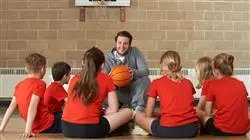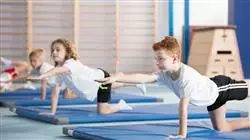University certificate
Scientific endorser

The world's largest faculty of sports science”
Introduction to the Program
Movement, as a tool for the development and enhancement of cognitive functions, is the key to the development and implementation of Neuroeducation in Physical Education. A novel concept of enormous importance for the quality of life of students”

Science has advanced in the study of the brain as a learning organ, with the aim of helping each student to develop their cognitive, intellectual and emotional potential to the fullest. Although current education aims at a comprehensive education, it is still focused on cognitive aspects, with little development in terms of emotional aspects; little and/or no management of one's own and others' emotions, little self-motivation and self-control, and communication skills.
This program arises with the purpose of expanding the benefits that can be offered from the subject of physical education to students, from the perspective of sports performance, academic performance, and also in relation to personal development based on physical and emotional well-being. This is based on the new knowledge of brain science to focus, in a practical way, on how to implement it in the reality of educational centers.
Physical Education acquires a dimension of extraordinary importance, transcending the important objectives of developing motor skills, to access the use of movement as a tool for the development and improvement of cognitive functions.
The prestigious professors of this program have deposited their specialized and advanced knowledge based on experience and rigorous scientific criteria in the development of this highly scientifically and academically rigorous training.
All modules are accompanied by abundant iconography, with photos and videos by the authors, which are intended to illustrate, in a very practical, rigorous and useful way, advanced knowledge in neuroeducation and physical education for physical therapists.
A highly effective Professional master’s degree that will provide you with the necessary tools to apply the neuroscience approach in Physical Education"
This Professional master’s degree in Neuroeducation and Physical Education in Sport contains the most complete and updated educational program on the market. The most important features include:
- Development of case studies presented by experts in Neuroeducation and Physical Education
- Its graphic, schematic and eminently practical contents provide scientific and practical information on those disciplines that are essential for professional practice
- Contains practical exercises where the self-evaluation process can be carried out to improve learning
- Its special emphasis on innovative methodologies in Neuroeducation and Physical Education
- All this will be complemented with theoretical lessons, questions to the expert, discussion forums on controversial issues and individual reflection work
- Availability of content from any device, fixed or portable, with an Internet connection
- Complementary content available in multimedia format
The quality of a program designed to promote Physical Education with the reinforcement of Neuroeducation, giving it a place of relevance in the training of students”
It includes, in its teaching staff, professionals belonging to the field of Neuroeducation and Physical Education, who pour into this training the experience of their work, in addition to recognized specialists belonging to reference societies and prestigious universities.
Thanks to its multimedia content developed with the latest educational technology, it will allow the professional a situated and contextual learning, that is to say, a simulated environment that will provide an immersive learning programmed to train in real situations.
The design of this program is based on Problem-Based Learning, by means of which the educator must try to solve the different situations of professional practice that arise throughout the specialization. For this, the educator will be assisted by an innovative interactive video system, developed by recognized experts in the field of Neuroeducation and Physical Education with extensive teaching experience.
Incorporate the neuroscience approach to your work in the area of Physical Education, and bring to your objectives, the goal of cognitive and emotional development of this new form of educational intervention”

New advances and developments in neuroscience applied to teaching in the area of Physical Education, from an eminently practical approach”
Why study at TECH?
TECH is the world’s largest online university. With an impressive catalog of more than 14,000 university programs available in 11 languages, it is positioned as a leader in employability, with a 99% job placement rate. In addition, it relies on an enormous faculty of more than 6,000 professors of the highest international renown.

Study at the world's largest online university and guarantee your professional success. The future starts at TECH”
The world’s best online university according to FORBES
The prestigious Forbes magazine, specialized in business and finance, has highlighted TECH as “the world's best online university” This is what they have recently stated in an article in their digital edition in which they echo the success story of this institution, “thanks to the academic offer it provides, the selection of its teaching staff, and an innovative learning method aimed at educating the professionals of the future”
A revolutionary study method, a cutting-edge faculty and a practical focus: the key to TECH's success.
The most complete study plans on the university scene
TECH offers the most complete study plans on the university scene, with syllabuses that cover fundamental concepts and, at the same time, the main scientific advances in their specific scientific areas. In addition, these programs are continuously being updated to guarantee students the academic vanguard and the most in-demand professional skills. In this way, the university's qualifications provide its graduates with a significant advantage to propel their careers to success.
TECH offers the most comprehensive and intensive study plans on the current university scene.
A world-class teaching staff
TECH's teaching staff is made up of more than 6,000 professors with the highest international recognition. Professors, researchers and top executives of multinational companies, including Isaiah Covington, performance coach of the Boston Celtics; Magda Romanska, principal investigator at Harvard MetaLAB; Ignacio Wistumba, chairman of the department of translational molecular pathology at MD Anderson Cancer Center; and D.W. Pine, creative director of TIME magazine, among others.
Internationally renowned experts, specialized in different branches of Health, Technology, Communication and Business, form part of the TECH faculty.
A unique learning method
TECH is the first university to use Relearning in all its programs. It is the best online learning methodology, accredited with international teaching quality certifications, provided by prestigious educational agencies. In addition, this disruptive educational model is complemented with the “Case Method”, thereby setting up a unique online teaching strategy. Innovative teaching resources are also implemented, including detailed videos, infographics and interactive summaries.
TECH combines Relearning and the Case Method in all its university programs to guarantee excellent theoretical and practical learning, studying whenever and wherever you want.
The world's largest online university
TECH is the world’s largest online university. We are the largest educational institution, with the best and widest online educational catalog, one hundred percent online and covering the vast majority of areas of knowledge. We offer a large selection of our own degrees and accredited online undergraduate and postgraduate degrees. In total, more than 14,000 university degrees, in eleven different languages, make us the largest educational largest in the world.
TECH has the world's most extensive catalog of academic and official programs, available in more than 11 languages.
Google Premier Partner
The American technology giant has awarded TECH the Google Google Premier Partner badge. This award, which is only available to 3% of the world's companies, highlights the efficient, flexible and tailored experience that this university provides to students. The recognition as a Google Premier Partner not only accredits the maximum rigor, performance and investment in TECH's digital infrastructures, but also places this university as one of the world's leading technology companies.
Google has positioned TECH in the top 3% of the world's most important technology companies by awarding it its Google Premier Partner badge.
The official online university of the NBA
TECH is the official online university of the NBA. Thanks to our agreement with the biggest league in basketball, we offer our students exclusive university programs, as well as a wide variety of educational resources focused on the business of the league and other areas of the sports industry. Each program is made up of a uniquely designed syllabus and features exceptional guest hosts: professionals with a distinguished sports background who will offer their expertise on the most relevant topics.
TECH has been selected by the NBA, the world's top basketball league, as its official online university.
The top-rated university by its students
Students have positioned TECH as the world's top-rated university on the main review websites, with a highest rating of 4.9 out of 5, obtained from more than 1,000 reviews. These results consolidate TECH as the benchmark university institution at an international level, reflecting the excellence and positive impact of its educational model.” reflecting the excellence and positive impact of its educational model.”
TECH is the world’s top-rated university by its students.
Leaders in employability
TECH has managed to become the leading university in employability. 99% of its students obtain jobs in the academic field they have studied, within one year of completing any of the university's programs. A similar number achieve immediate career enhancement. All this thanks to a study methodology that bases its effectiveness on the acquisition of practical skills, which are absolutely necessary for professional development.
99% of TECH graduates find a job within a year of completing their studies.
Professional Master's Degree in Neuroeducation and Physical Education in Sport
Neuroscience has established itself as a field with ample opportunities for application, with respect to the educational sector, it is a pillar for the development of new learning methodologies that improve results and ensure innovative teaching centers. The Professional Master's Degree in Neuroeducation and Physical Education in Sport of TECH Global University is presented as an excellent professional qualification opportunity for all pedagogues interested in standing out in their jobs. Our program consists of 1,500 instructional hours, throughout which students will have access to high quality contents, which will allow them to learn the bases and main elements of neuroeducation, as well as the latest advances in teaching processes found through brain science.
Postgraduate in Neuroeducation and Physical Education 100% online
Sports performance has undergone a drastic change in the last decade, as technological advances have allowed the collection of data and statistics to improve the physical strength of athletes optimally, however, the mentality and cognitive processes are fundamental factors in the preparation of a good athlete; for this reason, specializing in the neuroeducational field is an excellent bet for the future. In this context, our program provides students with the necessary knowledge to develop sophisticated study plans that focus on students' skills and boost their abilities from a group perspective without forgetting the importance of individual processes.







